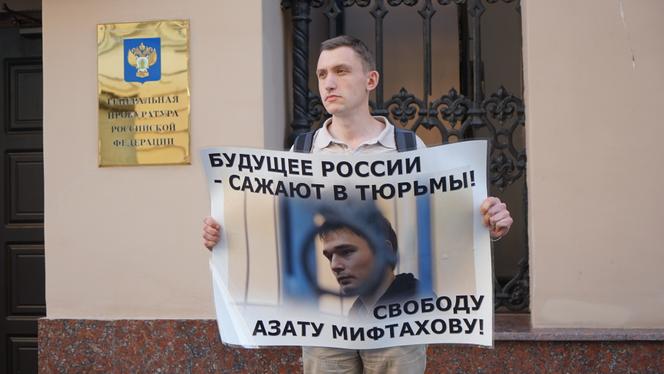


Azat Miftakhov only tasted freedom for a few minutes, the time it took to cross the few meters separating the gates of the IK-17 penal colony in the town of Kirov from those of the police van waiting for him outside. Released after four and a half years in prison, this young mathematician, whose case is receiving considerable attention in Russia and abroad, was immediately arrested on his release on Monday, September 4.
In 2019, the anarchist activist was arrested for having, according to the prosecution, broken a window in a building belonging to the ruling conservative United Russia party. The accusation now concerns acts allegedly committed in detention. Appearing via a television screen, Azat Miftakhov is said to have engaged in "deliberate justification of terrorist acts in front of two convicts."
"His mother was still hoping, but we, his friends, were expecting this scenario," his wife, Elena Gorban, who had come to wait for him outside the prison, told Le Monde. "The investigators had warned him a week ago that he would be arrested. And they had prepared things in advance. In recent weeks, Azat has been sent for long periods to solitary confinement. This has enabled the investigators to put pressure on the inmates they need as witnesses."
Miftakhov's lawyer was only able to negotiate a five-minute meeting between the 30-year-old and his relatives – his wife, mother and stepfather. Sympathizers who had come to greet him were moved away. "There was nothing joyful and not much to say," said Gorban. "Most of the time was spent hugging each other. Azat reassured his mother that he was holding up and would continue to do so." The young man reappeared the next day, Tuesday, in a cage at the Kirov court, to be served with new charges and sent to pre-trial detention.
A release immediately followed by arrest, a common practice in Russia, had already been used at the start of the case. Police suspected Miftakhov, then a brilliant doctoral student in mathematics at Moscow University, of making explosives. In the absence of any incriminating evidence, investigators were forced to release him after a week of interrogation – and torture, according to him.
Miftakhov was immediately arrested again, this time in the courtyard of the police station, on a different charge: the mathematician had allegedly smashed the window of a United Russia office before others threw a smoke bomb into the premises. During the trial, Miftakhov's co-defendants cleared his name while accepting the charges. From then on, the prosecution relied entirely on an anonymous witness who claimed to have recognized the accused, despite his mask, by "his expressive eyebrows." Miftakhov was sentenced to six years in prison.
You have 44.19% of this article left to read. The rest is for subscribers only.
